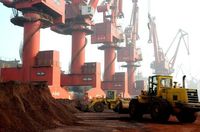China has suspended exports of a wide range of critical minerals and magnets, a move that threatens to choke off supplies of essential components for automakers, aerospace manufacturers, semiconductor companies, and military contractors around the globe. The halt in shipments, particularly of magnets crucial for assembling everything from cars and drones to robots and missiles, has been enforced at many Chinese ports while the government drafts a new regulatory system.
This regulatory framework, once in place, could permanently prevent supplies from reaching certain companies, including American military contractors, marking a significant escalation in trade tensions. The official crackdown is seen as retaliation for President Trump’s sharp increase in tariffs that began on April 2, 2025.
On April 4, 2025, the Chinese government ordered restrictions on the export of six heavy rare earth metals, which are refined entirely in China, alongside rare earth magnets, 90 percent of which are produced within the country. The new regulations stipulate that these metals and special magnets can only be shipped out of China with special export licenses. However, the process for issuing these licenses has barely begun, raising concerns among industry executives about potential delays and the risk of running low on current supplies.
If factories in Detroit and elsewhere exhaust their stock of powerful rare earth magnets, it could halt the assembly of cars and other products that rely on electric motors, which require these magnets. Companies vary widely in their emergency stockpiles for such contingencies, making it difficult to predict when production disruptions might occur.
The heavy rare earth metals affected by the export suspension are crucial for manufacturing magnets utilized in various electric motors, which are integral components of electric vehicles, drones, robots, missiles, and spacecraft. Even gasoline-powered cars depend on electric motors with rare earth magnets for critical functions like steering. These metals also play a vital role in the production of chemicals for jet engines, lasers, car headlights, and certain spark plugs. Furthermore, they are essential ingredients in capacitors, which are electrical components found in the computer chips powering artificial intelligence servers and smartphones.
Michael Silver, the chairman and chief executive of American Elements, a chemicals supplier based in Los Angeles, indicated that his company had been informed it would take 45 days before export licenses could be issued and exports of rare earth metals and magnets could resume. Silver noted that his company had increased its inventory last winter in anticipation of a trade war between the United States and China, allowing them to fulfill existing contracts while awaiting the necessary licenses.
Daniel Pickard, chairman of the critical minerals advisory committee for the Office of the United States Trade Representative and Department of Commerce, expressed serious concerns about the availability of rare earths. "Does the export control or ban potentially have severe effects in the U.S.? Yes," he stated, emphasizing the need for a swift resolution to the issue. He warned that a prolonged disruption could damage China’s reputation as a reliable supplier.
In a potential complication, China’s Ministry of Commerce, which issued the new export restrictions in conjunction with the General Administration of Customs, has barred Chinese companies from engaging with an expanding list of American firms, particularly military contractors. James Litinsky, the executive chairman and chief executive of MP Materials, highlighted the specific concerns surrounding rare earth supplies for military contractors. "Drones and robotics are widely considered the future of warfare, and based on everything we are seeing, the critical inputs for our future supply chain are shut down," he remarked.
MP Materials operates the only rare earths mine in the United States, located in the Mountain Pass mine in the California desert near the Nevada border. The company hopes to commence commercial production of magnets in Texas by the end of the year, catering to General Motors and other manufacturers. Unlike some Japanese companies that maintain rare earth inventories exceeding a year’s supply—having learned from a previous embargo in 2010—many American firms keep minimal stockpiles to avoid tying up cash in expensive materials.
One of the metals subject to the new controls, dysprosium oxide, is currently trading at $204 per kilogram in Shanghai, significantly more outside of China. While rare earth magnets constitute a small fraction of China’s overall exports to the United States and other nations, halting these shipments inflicts minimal economic pain on China while posing significant risks for the U.S. and other countries.
Chinese customs officials are blocking exports of heavy rare earth metals and magnets not only to the United States but also to countries like Japan and Germany. However, enforcement of the new export license requirement has been inconsistent among different Chinese ports, according to rare earth industry executives. Some ports are allowing exports of magnets that contain only minimal traces of heavy rare earth metals, provided they are not destined for the United States. Conversely, other ports are implementing stricter measures, requiring exporters to conduct tests to confirm that any batch of magnets does not contain heavy rare earth metals before loading them for export.
The export restrictions took effect before the Trump administration announced on Friday night that it would exempt many types of consumer electronics from its latest tariffs on China. As of this past weekend, magnet exports remained blocked, according to five rare earth industry executives.
Until 2023, China accounted for 99 percent of the global supply of heavy rare earth metals, with a small amount coming from a refinery in Vietnam that has been closed due to a tax dispute. This situation has left China with a near-monopoly in the market. Additionally, China produces 90 percent of the world’s nearly 200,000 tons of rare earth magnets annually, with Japan and Germany contributing only a fraction of the remaining supply, both heavily reliant on China for raw materials.
The richest deposits of heavy rare earths are located in a small valley on the outskirts of Longnan in Jiangxi Province, where most of China’s refineries and magnet manufacturing facilities are situated. The JL Mag Rare-Earth Company, the country’s most renowned magnet factory, supplies leading electric car manufacturers like Tesla and BYD with powerful magnets. Notably, Xi Jinping visited JL Mag’s facility in 2019, during a period of heightened trade tensions, suggesting China’s readiness to leverage its control over these materials to disrupt American supply chains.
In recent developments, mining operations near Longnan, which had been paused due to severe chemical pollution, appear to have resumed, as indicated by activity at one mine site.


